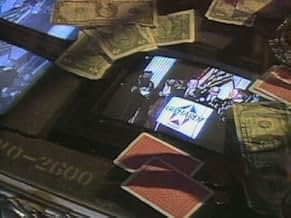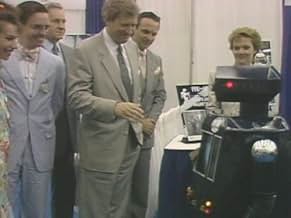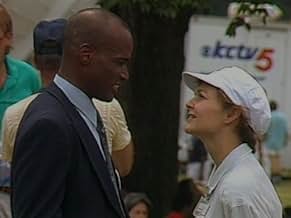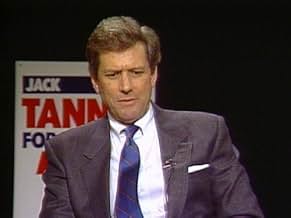A behind-the-scenes look at a former Michigan U.S. Representative's campaign as he vies for his party's Presidential nomination.A behind-the-scenes look at a former Michigan U.S. Representative's campaign as he vies for his party's Presidential nomination.A behind-the-scenes look at a former Michigan U.S. Representative's campaign as he vies for his party's Presidential nomination.
- Won 1 Primetime Emmy
- 4 wins & 3 nominations total
Featured reviews
Which is interesting since it sometimes has that long feeling of an Altman shot here and there, or one that is held for longer than one might expect in a TV show; one crucial shot being when Jack Tanner (Michael Murphy) is shot unawares by a camera looking through a glass coffee table as he gives a passionate monologue to his campaign team after a bad day. Shots like these, or when two characters have a conversation for a stretch of time (i.e. Tanner and the governor Bruce Babbit talking along the Potomac) should be self-conscious, but they aren't. And other times the trademark Altmanesque approach to shooting is actually spot-on for a kind of soap opera quality to the proceedings that ends up lending itself to comedy more than the melodramatic moment of revelation. It's a great moment of comedy, for example, not merely in the look between Stringer (Daniel Kincaid) and Joanna Buckley (Wendy Crewson) as he knows it's Dukakis's campaign manager who's been sleeping around with Tanner, and likewise she knows he knows, but how the shot goes, a quick zoom in on each other's eyes, as if the audience didn't know- which of course we do- and the light touch of theme music in the background.
Tanner '88 is also great entertainment as far as being able to expect "For Real" reality, to quote an episode, as Tanner encounters real politicians, for the most part not knowing that it's a fictional show (Pat Robertson, for example). We know how this will all end, but the question of the how and when is what strikes up drama and madness in equal measure, as if even in the most predictable means it adds to the appeal (new campaign supervisors on how to speak more forcefully and with strict attention, then the scandal(s), awkward campaign stops, a not-quite assassination attempt as one of the funniest asides, dissension from reporters). And touches of irony help along the way, like how Veronica Cartwright's reporter, who at first is not getting much of the scoop, and how she soon acquires the fired former camerman on Tanner's inner circle (let go for an uproariously stupid montage video on drug legalization, taken mostly from Tanner's notebook) who shoots like many a pretentious reality-TV cameraman- and then also reports first on the affair scandal to boot! I also liked how Kitty Dukakis got figured into the actual storyline, as opposed to just another throwaway political figure.
And all the while Murphy is a total pro- robbed of an Emmy severely in fact- and there ends up being more for him to do as an actor, in playing a sympathetic but flawed character who as TJ describes about his running for president is like a "lifestyle choice." Pamela Reed, Cynthia Nixon and Ilana Levine make up the principle female characters, all with their own pragmatic, optimistic, and just frustrated views on the campaign trail, and they're great to have in the midst of an otherwise predominantly male cast. It's important that they too are right on the ball with Murphy at just saying the right things when diverting from Trudau's script. Suddenly it doesn't feel like we're simply seeing a fictional account of a debate between Tanner, Jesse and Dukakis, but it's more immediate than that. Even more-so than Primary Colors we're given a first-hand look at the process, the ugliness and dirty side, the idiots and mistakes made consistently, the cynicism and irony, and how the media and politics are inseparable and insufferable depending on the beat. And it has the immediacy of news while keeping a hold on the multi-dimensional framework that Altman mastered in his career.
Taken as a whole work it is very long, but worth every moment of extra characterization, and ever extra song performance of the theme (my favorite was the hair metal version at the fundraiser in Los Angeles), and it's one of the most insightful, amusing, and superlative works from a quintessential American director.
The mini-series of 10 half-hour episodes is available on three VHS tapes.
It was excellent, overall. Especially good was the way it punctured so many of the hot-air balloons and pretensions of American politics, but clearly sympathized with the people who want to believe in it. We see a liberal Democratic candidate, Jack Tanner, played skillfully by Michael Murphy, go through a campaign from the New Hampshire primary to the end of the convention. Typical of the series, Tanner is on the one hand shallow and full of empty rhetoric, while also sincere, idealistic and sometimes inspiring. Tanner's campaign manager, a woman, is also extremely smart, more than a little cynical, but capable of being inspired by her candidate whose weaknesses she knows very well. The first half of the series, which takes place in New Hampshire, is extremely funny, especially in showing how the citizens there have become inured to the hoopla of the candidates and the media. Also outstanding in this series is the way the working press is portrayed as part of the life of the campaign--these are real people, not just role players. The last two episodes, at the convention, lack the bite of the first five or or six, and could be skipped without losing much.
I don't know why it took so long for someone to pair "Doonesbury" writer Garry Trudeau with Altman, because in retrospect, it seems like a match made in heaven. Both have the exact same sarcastic sense of humor and the talent for seeing the absurd in the mundane. They crafted a fascinating look into the world of political machinations, following the story of fictitious 1988 presidential candidate Jack Tanner but setting it against the real world of the democratic primaries. Therefore, actual members of the political scene at the time interact with star Michael Murphy as if he's a real presidential nominee, and the viewer is never sure what action is authentic and what is staged.
Murphy is superb as Tanner, and he's perfectly cast. Tanner is handsome and charismatic enough to make a fairly successful run for the nomination, but he's too bland and too nice to make it all the way. The series examines one of the major conundrums about American politics: to have a candidate with conviction and good ideas isn't enough. He must also be a personality and be able to navigate the tricky terrain of the American media, with the result that those who go farthest are those who know how to work the system, not those who are most honest. "Tanner '88" captured perfectly my own feelings about presidential elections. On the one hand, they're of supreme importance, because they determine who will be the leader of one of the most powerful nations in the world. But on the other hand, they seem like such pointless exercises, and it's hard to muster up the energy to care time after time.
But one of the strongest and most serious points made by this series comes in an episode in which Tanner visits the slums of Detroit in his home state of Michigan. He realizes that he is completely out of touch with the very people he promises to help, and has no clue about what their lives are really like. That's painfully true about our own leadership -- it was in 1988 and still is today. There's a vast and probably insurmountable gap between the privileged few who ever have the remotest hope of being president and the millions of average Americans over whom they govern.
All of the acting in "Tanner '88" is sensational, to the point where I forgot I wasn't just watching real people being filmed by a documentary filmmaker. Most notable are Pamela Reed, as Tanner's campaign manager, Cynthia Nixon, as his overbearing and very young daughter, and E.G. Marshall, who makes a few memorable appearances as Tanner's awful father.
This is a must see for Altman fans, or really anyone with an interest in American politics.
Grade: A+
This one is as brilliant, funny and thought-provoking as the best of the writer and director's solo projects. All the performances are terrific -- Pamela Reed, in particular, shows why she's one of the most interesting American actresses working today.
Did you know
- TriviaAaron Sorkin has acknowledged that this miniseries had an influence on The West Wing (1999), which he created, in its underlying idealism, and in its view of political staffers as people who at least struggle to do the right thing.
- Quotes
[making a toast at his son's wedding rehearsal dinner]
Tanner's Father: One hundred years ago, William Gladstone, after a particularly acrimonious debate in Parliament, bellowed across the floor at his arch-rival Benjamin Disraeli, "You, sir," he said, "will one day end your days on the gallows or of venereal disease." Disraeli raised himself up and replied, "That, sir, would depend on whether I embrace your principles or your mistress."
Alex Tanner: Grandpa.
Tanner's Father: I tell this humorous story because it hasn't been altogether clear to me this past year exactly what my son is embracing.
Jack Tanner: Dad!
[Jack's fiancee gets up from the table and leaves]
- Alternate versionsAs a prelude to the first screening of the sequel _"Tanner on Tanner" (2004) (mini)_, the original mini-series was shown again on the Sundance Channel (in the US) and BBC 4 (in the UK). The re-release was subtitled "Once More in '04", and each episode was preceded by a newly filmed introduction, in which one of the main characters talks to camera about their memories of the '88 campaign, 16 years on.
- ConnectionsFeatured in Siskel & Ebert Holiday Video Gift Guide (1992)
- How many seasons does Tanner '88 have?Powered by Alexa
Details
- Release date
- Country of origin
- Official site
- Language
- Also known as
- Tanner 88
- Production company
- See more company credits at IMDbPro




































